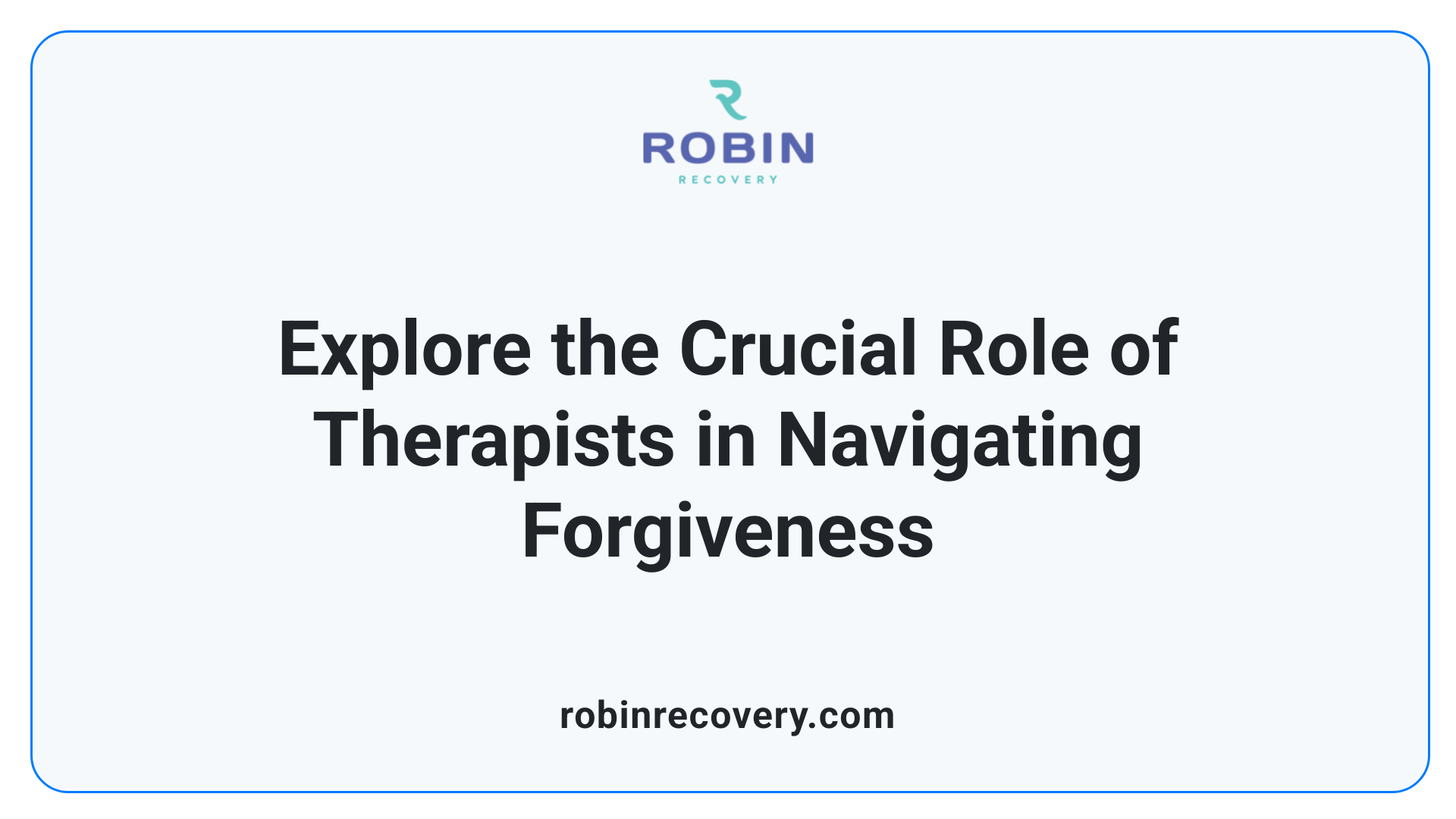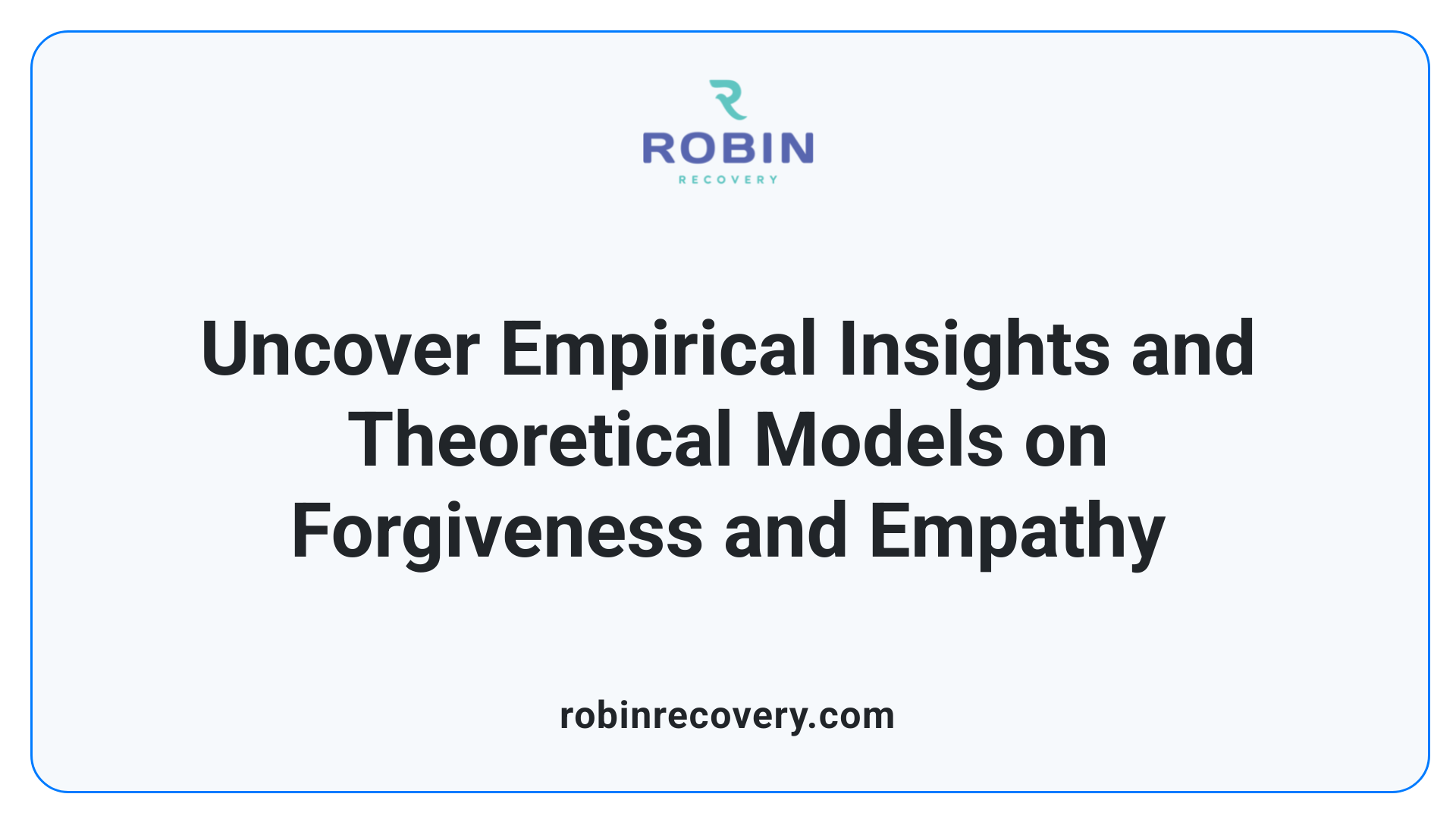How to Foster Empathy and Forgiveness in Family Therapy

Introduction to Empathy and Forgiveness in Family Therapy
Families often encounter conflicts and misunderstandings, stemming from closely-knit relationships and differing values. In family therapy, fostering empathy and forgiveness is crucial for healing and improving interactions. These elements help repair trust, facilitate open communication, and enhance emotional connections among family members. By exploring models and interventions centered around empathy and forgiveness, therapists can guide families toward healthier dynamics.
The Role of Therapists in Facilitating Forgiveness

What do therapists say about forgiveness?
Therapists often emphasize that forgiveness plays a crucial role in healing and personal growth. It allows individuals to release feelings of anger and resentment, promoting better emotional and mental well-being. Research shows that engaging in forgiveness can alleviate symptoms of anxiety, depression, and stress. Notably, forgiveness is seen as a personal journey that doesn’t always require reconciliation with the offender.
Therapists guide clients to explore what forgiveness means for them. They employ various strategies to navigate the complexities of forgiveness, such as enhancing self-compassion. Structured models, like Robert Enright's four-phase process, provide clear steps to identify and work through emotions surrounding hurt.
Importance of forgiveness in therapy
Forgiveness is essential in therapy because it contributes to emotional healing and relationship repair. Therapists recognize that unresolved negative emotions can lead to serious mental and physical health issues, including stress and cardiovascular problems. By fostering a commitment to forgiveness, therapists help clients move from a state of pain to one of compassion, ultimately improving their quality of life.
Structured models and processes
Several structured models assist in the therapeutic process of forgiveness. For example, the REACH model involves five stages: recalling the hurt, empathizing, giving an altruistic gift of forgiveness, committing to forgive, and holding onto forgiveness. Each phase is designed to deepen understanding and foster empathy, enhancing the likelihood of a healing journey for both clients and their families.
Model Steps Involved Purpose Enright Model Uncovering, decision-making, cognitive reframing, deepening Structured guidance for internal processing REACH Model Recall, Empathize, Altruistic gift, Commit, Hold onto forgiveness Fostering empathy and commitment in healing
Through these models, therapists foster environments where clients can unlock the mechanisms of forgiveness, paving the way for emotional liberation and improved relationships.
Therapeutic Models for Forgiveness

What are some forgiveness interventions used in therapy?
Forgiveness interventions in therapy focus on helping individuals process their feelings and cultivate forgiveness. Two prominent models are the REACH model and Enright's four-phase model.
REACH Model: This model consists of five steps aimed at fostering empathy and forgiveness:
- Recall the hurt: Engage with the emotional pain caused by the offense.
- Empathize with your partner: Understand the offender’s perspective, which aids in emotional resolution.
- Altruistic gift of forgiveness: View forgiveness as an act of kindness, benefiting both parties.
- Commit to the act of forgiveness: Make a conscious choice to forgive.
- Hold onto forgiveness: Maintain the decision to forgive over time.
Enright's Four-Phase Model: This approach unfolds in several stages:
- Uncovering emotional pain: Identifying and acknowledging hurt feelings.
- Decision-making process: Choosing to forgive as a transformational option.
- Cognitive reframing: Changing the narrative around the offense to allow for healing.
- Deepening: Reflecting on the benefits that forgiveness brings to one’s mental health and well-being.
Impact of forgiveness therapy
Research indicates that forgiveness therapy can significantly reduce symptoms of depression and anxiety while promoting mental wellness. By allowing individuals to let go of past grievances, these therapeutic practices lead to emotional healing and stronger interpersonal relationships.
Practices such as self-compassion and positive affirmations are also vital components of the healing process.
Through structured interventions like these, therapists equip clients not only to manage their emotional turmoil but to experience genuine personal growth, making forgiveness a cornerstone of their well-being.
Incorporating Forgiveness Exercises into Therapy

How can forgiveness exercises be incorporated into therapy?
Forgiveness exercises can be effectively integrated into therapy by using structured activities aimed at promoting emotional healing. Here are some techniques therapists can employ:
- Letter Writing: Engaging clients in writing letters to express feelings—whether or not they intend to send them—can serve as a cathartic release. This practice helps articulate emotions connected to past hurts and encourages reflection on one's journey towards forgiveness.
- Meditation: Incorporating meditation into sessions helps calm the mind and encourages individuals to let go of negative feelings. Through mindfulness, clients can often find clarity and a sense of peace, making the process of forgiving feel more attainable.
- Gratitude Exercises: Fostering an attitude of gratitude shifts the focus from negativity to positive aspects of life. By recognizing what they appreciate, clients can create a more forgiving mindset.
- Acts of Kindness: Encouraging clients to perform small acts of kindness, either for themselves or others, can reinforce the concept of compassion in the forgiveness process. This nurtures emotional well-being alongside the journey of forgiving.
- Self-Compassion Practices: Therapists emphasize that caring for one’s emotional state is vital. Exercises that promote self-kindness can aid clients in developing a forgiving outlook towards themselves and others.
By combining these techniques, therapists can create a supportive environment conducive to healing, where clients feel empowered to embrace forgiveness actively and constructively.
Empathy as a Catalyst for Forgiveness

How does empathy relate to forgiveness in therapy?
Empathy plays a significant role in fostering forgiveness within therapy. Individuals who exhibit higher levels of empathy are more likely to forgive those who have wronged them. Research shows that empathetic responses can significantly enhance forgiveness, especially in situations that might seem unfamiliar to someone.
For instance, a study involving 50 women and 20 men highlighted a positive correlation between empathy and forgiveness, with those who demonstrated greater empathy expressing a higher willingness to forgive. This indicates that cultivating empathy can be a vital strategy in therapy to deal with interpersonal conflicts.
Interestingly, while prior experiences can enhance a person's ability to empathize, they are not always essential for the process to take place. Context matters; for example, religiosity has also been found to bolster both empathy and forgiveness. This suggests that individuals with strong religious affiliations may find it easier to empathize with and ultimately forgive those who transgress against them.
Impact of empathy on relationships
The impact of empathy reaches far beyond individual interactions. In family therapy, empathy is often described as the "psychological superglue" that fosters cooperation and strong connections among family members. By helping individuals see others more humanely, empathy lays a foundation for meaningful dialogue, which is crucial in resolving misunderstandings and conflicts within family dynamics.
Furthermore, empathy promotes deeper connections that support healthier communication and emotional liberation as families navigate their differences. It helps individuals acknowledge their imperfections, fostering a culture of acceptance and compassion, which is essential for both forgiveness and reconciliation. Thus, enhancing empathy can lead to profound transformation in familial relationships, enabling forgiveness and restoring harmony.
The Four R's: A Framework for Self-Forgiveness
What are the four R's of forgiveness and how are they applied in therapy?
The four R's of forgiveness—Responsibility, Remorse, Restoration, and Renewal—provide an essential framework for self-forgiveness, particularly beneficial in therapeutic settings.
- Responsibility: This first step focuses on acknowledging one’s actions and the impact they may have had on oneself and others. It emphasizes the importance of showing compassion towards oneself while taking ownership of one’s mistakes.
- Remorse: Here, individuals are encouraged to explore the feelings of guilt and regret that naturally arise from their actions. This remorse is not meant to paralyze but rather to serve as a catalyst for positive change.
- Restoration: This step underscores the significance of making amends where possible. It involves actively seeking to restore relationships and rectify wrongdoings, fostering a sense of accountability.
- Renewal: The final R emphasizes learning from past experiences to promote personal growth. It involves reflecting on what has been learned and how it can inform better choices in the future.
Therapeutic practices, such as Compassion-Focused Therapy, are instrumental in facilitating self-forgiveness. These approaches help individuals manage negative emotions while fostering a deeper sense of self-compassion and understanding. Ultimately, self-forgiveness is recognized as a gradual process, necessitating emotional reflection and the commitment to let go of resentment while embracing constructive behaviors.
Creating an Environment for Empathy and Forgiveness
In what ways can therapists facilitate empathy and forgiveness among family members?
Therapists play a crucial role in promoting empathy and forgiveness within family dynamics. By establishing a safe and open environment, they allow family members to express their emotions and vulnerabilities without fear of judgment. This setting is essential for facilitating honest dialogue.
Utilizing structured therapeutic models like the Enright and REACH models is a cornerstone of their approach. For instance, the REACH model guides clients through five steps—from recalling hurt to committing to forgiveness—encouraging individuals to recognize and articulate their feelings.
Additionally, therapists educate families on the true nature of forgiveness. They clarify that forgiveness is about letting go of resentment rather than condoning harmful behaviors or necessarily reconciling with those who have hurt them. This understanding is vital as it reshapes clients' perspectives on their relationships with others.
Moreover, therapists often emphasize cognitive restructuring, helping individuals challenge negative thoughts and promote empathy. By understanding that everyone has struggles and imperfections, clients can shift away from blame and towards compassion.
Ultimately, through these processes, therapists not only enhance individual wellbeing but also improve relational dynamics, leading to deeper connections and healing within the family.
Structured interventions for empathy
Structured interventions provide a pathway for fostering empathy among family members. These methods help individuals grasp the complexity of each other's experiences—crucial for healing wounds.
Practices include:
- Active Listening: Family members are encouraged to listen without interruption, allowing genuine understanding.
- Reflective Questions: Therapists guide participants to consider why others might have acted the way they did, promoting perspective shifts.
- Emotional Acknowledgment: Recognizing and validating each other’s emotions is key to creating a supportive atmosphere.
Through these structured steps, families can cultivate empathy, ultimately leading to forgiveness and restoration of healthy dynamics.
Empathy Training Techniques in Family Therapy
How Can Empathy Exercises Aid Family Therapy?
Empathy exercises are essential tools in family therapy that help foster relationships and improve communication. These exercises encourage family members to express their thoughts and feelings openly while actively listening to each other. This interaction is designed to develop a deeper understanding of one another’s perspectives, promoting awareness of the emotional landscapes everyone navigates.
Some effective empathy exercises include:
- Role Reversal: Have family members switch positions and articulate each other’s feelings. This experience can help them appreciate different viewpoints.
- Active Listening Drills: Family members take turns sharing their thoughts about a specific issue while the others practice not interrupting, ensuring full attention.
- Open-Ended Questions: Encourage family members to ask each other questions that invite detailed responses to foster richer conversations.
How Does Empathy Enhance Family Communication?
Enhancing family communications through empathy can significantly improve conflict resolution and relationship strength. When family members feel understood, they are more likely to express their emotions constructively rather than through anger or blame.
Key components of empathetic communication include:
- Validation of Feelings: Acknowledgment of each member’s feelings without judgment promotes a safe space for vulnerability.
- Curiosity and Interest: Creating an atmosphere where family members feel comfortable sharing their experiences leads to meaningful dialogues.
- Mindfulness in Conversations: Encouraging presence during discussions helps to minimize misunderstandings and reinforces connections between family members.
By integrating these techniques into family therapy, therapists can guide families towards notable emotional improvements and cohesive dynamics.
Reconciliation and Forgiveness: Distinctions and Implications
Differences between forgiveness and reconciliation
Forgiveness and reconciliation are often confused, but they serve distinct roles in healing relationships. Forgiveness is a personal decision to let go of resentment and extend compassion toward the offender. It involves releasing negative emotions without necessarily condoning the behavior that caused harm.
On the other hand, reconciliation requires a mutual effort from both parties. It focuses on restoring trust and rebuilding relationships after acknowledging the harm done. Reconciliation can only occur when both individuals commit to resolving conflicts together and work towards a healthier future.
Therapeutic approaches to both
In therapy, practitioners often use models like the Enright Model and the REACH Model to facilitate the process of forgiveness. For example, the REACH Model involves:
- Recall the hurt: Bring to mind the pain caused by the offense.
- Empathize with the offender: Understand their perspective, which can aid in forgiveness.
- Altruistic gift of forgiveness: View forgiveness as an act of kindness.
- Commit to forgiving: Make a conscious decision to forgive.
- Hold onto forgiveness: Maintain this choice over time.
Therapists also emphasize that while forgiveness can lead to personal healing, reconciliation may be possible only once trust is re-established. Both processes enhance emotional well-being and are critical for transforming family dynamics into healthier interactions.
Research and Theoretical Insights on Forgiveness and Empathy

Empirical studies on forgiveness
Research highlights that forgiveness is not just an emotional release but also a critical factor linked to both mental and physical well-being. Studies have shown that individuals who engage in forgiveness experience reduced levels of stress, anxiety, and depression. This is especially crucial in family dynamics, where unresolved conflicts can lead to ongoing resentment and emotional turmoil.
Furthermore, when clients practice forgiveness, they tend to develop healthier interpersonal relationships. Research indicates that both self-forgiveness and forgiving others contribute significantly to overall mental health, enhancing self-esteem and emotional freedom.
Theoretical models in therapy
Two prominent models used in therapeutic settings to facilitate forgiveness are the Enright Model and the REACH Model.
ModelComponentsPurposeEnright Model 1. Uncovering
2. Decision making
3. Cognitive reframing
4. Deepening To guide the client through the forgiveness process, allowing emotional healing. REACH Model 1. Recall the hurt
2. Empathize with the offender
3. Give an altruistic gift of forgiveness
4. Commit to forgive
5. Hold onto forgiveness To cultivate compassion and empathy toward the offender, supporting mental health recovery.
These models demonstrate that forgiveness therapies focus on fostering empathy—essential for interpersonal connections and conflict resolution. By understanding and empathizing with others, individuals can more effectively navigate the path to forgiveness.
Conclusion: The Transformative Power of Empathy and Forgiveness
Empathy and forgiveness stand as pillars of transformational change in family therapy. By facilitating understanding and compassion, therapists can help families navigate through conflicts and mend fractured relationships. With structured models and exercises, individuals can work towards releasing resentment and enhancing emotional bonds. As research continues to underscore the benefits of empathy and forgiveness, these elements are essential for healthier family dynamics and emotional well-being. Through compassion and empathy, families can achieve profound healing and stronger connections.
References
- Forgiveness Therapy: 6+ Techniques to Help Clients Forgive
- The Power of Forgiveness in Family Counseling
- [PDF] Enabling forgiveness and reconciliation in family therapy
- [PDF] Forgiveness in Couple and Family Therapy - Frank Fincham
- The Importance of Compassion and Empathy When Forgiving
- Cultivating empathy - American Psychological Association
- How to Cultivate Empathy and Foster Forgiveness in Challenging ...
- Navigating the Path of Healing: Forgiveness versus Reconciliation
